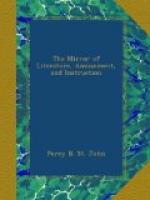Mr. John Smeaton, who erected the Eddystone Lighthouse, in the years 1757-58 and 59, was born on the 28th, of May, 1724, at Ansthorpe, near Leeds. The strength of his understanding, and the originality of his genius, (says his biographer) appeared at an early age: his playthings were not the playthings of children, but the tools which men employ, and when he was a mere child he appeared to take greater pleasure in seeing the operations of workmen, and asking them questions, than in any thing else. Before he was six years old, he was once discovered at the top of his father’s barn, fixing up what he called a windmill of his own construction, and at another time, while he was about the same age, he attended some men fixing a pump, and observing them cut off a piece of a bored part, he procured it, and actually made a pump, with which he raised water. When he was under fifteen years of age, he made an engine for turning, and worked several things in ivory and wood. He made all his own tools for working in wood and metals, and he constructed a lathe, by which he cut a perpetual screw in brass, a thing but little known, and which was the invention of Mr. Henry Hendley of York. His father was an attorney, and being desirous to bring up his son to the same profession, he brought him up to London with him in 1724, and attended the courts in Westminster Hall; but after some time, finding that the law was not suited to his disposition, he wrote a strong memorial to his father on the subject, who immediately desired the young man to follow the bent of his inclination.
P.T.W.
* * * * *
SPIRIT OF THE PUBLIC JOURNALS
* * * * *
LINES
To a Friend who had spent some days at a Country Inn, in order to be near the Writer.
BY MISS MITFORD
The village inn, the woodfire burning
bright,
The solitary taper’s flickering
light,
The lowly couch, the casement swinging
free,—
My noblest friend, was this a place for
thee?
No fitting place! Yet there, from
all apart,
We poured forth mind for mind and heart
for heart,
Ranging from idle words and tales of mirth
To the deep mysteries of heaven and earth
Yet there thine own sweet voice, in accents
low,
First breathed Iphigenias tale of wee,
The glorious tale, by Goethe fitly told,
And cast as finely in an English mould
By Taylor’s kindred spirit, high
and bold:[21]
No fitting place! yet that delicious hour
Fell on my soul, like dewdrops on a flower
Freshening and nourishing and making bright
The plant, decaying less from time than
blight,
Flinging Hope’s sunshine o’er
the faint dim aim,
Thy praise my motive, thine applause my
fame.
No fitting place! yet (inconsistent strain
And selfish!) come, I prithee, come again!




